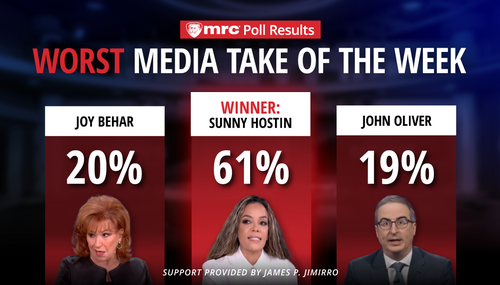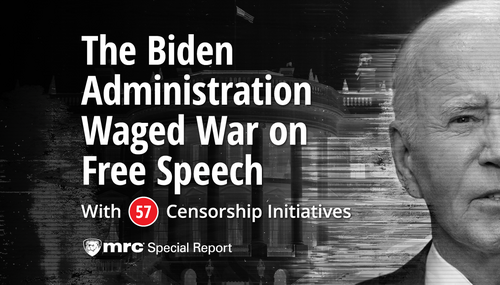
As for his own personal foreign policy, Alter advocated a much softer tone with our enemies. Ultimatums don’t work, so "I personally favor much closer relations between the United States and Iran because, as Obama said during the campaign, you have to talk to your enemies." Here's how it unfolded:
OLBERMANN: It seemed so radical to hear an American president say United States is not and can’t be at a war with Islam. Is that a clarification that needed to be made? And is there any way to gauge how much it needed to be made?
ALTER: It absolutely had to be made. This was a huge and extremely important do-over for the United States in the Muslim world. You know, under Bill Clinton, we had pretty good relations in that part of the world.
Alter then gently tried to elide Olbermann’s obvious error, that somehow saying "we’re not at war with Islam" is a brand-new sentiment, that President Bush never said it. (He said it repeatedly.) Alter said Bush’s moderate talk was ruined by his actions:
I think, President Bush, after 9/11, wanted to reach out to more moderate Muslims, but in pretty much everything he said, he hurt himself in that effort. So we had a "good versus evil, us versus them" kind of foreign policy where when you throw in Abu Ghraib and Guantanamo and the war in Iraq, it`s understandable why the Muslim world would get this message -- that the United States did not wish them well. So, it’s extremely important that President Obama make this crystal clear as he did this week.
Since this was a comfortable chat among liberals, no one bothered to raise the inconvenient truth that Bill Clinton’s "pretty good relations" in the Muslim world utterly failed to prevent 9/11 and never led to a peace the Palestinian radicals would accept. Alter wasn't pressed to consider that Clinton's era of "pretty good relations" didn’t stop the World Trade Center attack of 1993, the slaughter of American airmen at Khobar Towers in 1995, the embassy bombings in Kenya and Tanzania in 1998, or the attack on the U.S.S. Cole in 2000. If Bush hurt relations with Muslim countries with Iraq, did Clinton damage them with the bombings in Afghanistan and Sudan and Iraq in 1998?
Olbermann simply suggested that Bush was opposed to the concept of allies in the Middle East (as if Bush never wanted one, and never had one):
OLBERMANN: Should it have been crystal clear to this nation for the last eight years that the U.S. was not going to succeed at containing the nuclear threat in Iran without allies in the Muslim world, rather than people just who might be if we`re mean enough to them scared of us?
ALTER: Yes. Ultimatums generally don`t work. What works best is actually regional diplomacy -- even though, you know, I personally favor much closer relations between the United States and Iran because, as Obama said during the campaign, you have to talk to your enemies.
Before you get to that, before you get to U.S.-Iranian relations, have you to create a structure of peace and arms control in the region, in that part of the world. Otherwise, you will have not just Iranian nukes, but an arms race throughout that area with perhaps Egypt and others getting nuclear weapons. That would be a true disaster for the world.
The same question applies to these comments. Surely, the Clinton administration also recited the liberal rhetoric about a "structure of arms control," but at what time in the Clinton years did their diplomacy lead to an end to Iranian nuclear ambitions?
It sounded like Jonathan Alter wasn't so much looking for results, but just preferred a change in tone and temperament: multilateral beats unilateral, talking beats threatening and fighting, and, although it did not come up too explicitly, turning down the judgmental sound of the "war on terror" beats Bushian "certitude" about "evil." Will these pundits actually reflect on this stance if Iran or the Middle East don't improve in the next few years?




